奥巴马总统在南非前总统曼德拉追悼会上的悼辞
奥巴马悼念曼德拉逝世中英文演讲稿-演讲致辞模板
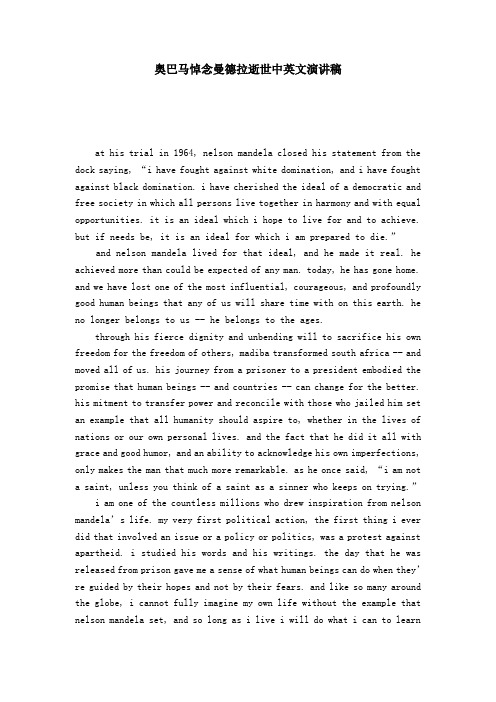
奥巴马悼念曼德拉逝世中英文演讲稿at his trial in 1964, nelson mandela closed his statement from the dock saying, “i have fought against white domination, and i have fought against black domination. i have cherished the ideal of a democratic and free society in which all persons live together in harmony and with equal opportunities. it is an ideal which i hope to live for and to achieve. but if needs be, it is an ideal for which i am prepared to die.”and nelson mandela lived for that ideal, and he made it real. he achieved more than could be expected of any man. today, he has gone home. and we have lost one of the most influential, courageous, and profoundly good human beings that any of us will share time with on this earth. he no longer belongs to us -- he belongs to the ages.through his fierce dignity and unbending will to sacrifice his own freedom for the freedom of others, madiba transformed south africa -- and moved all of us. his journey from a prisoner to a president embodied the promise that human beings -- and countries -- can change for the better. his mitment to transfer power and reconcile with those who jailed him set an example that all humanity should aspire to, whether in the lives of nations or our own personal lives. and the fact that he did it all with grace and good humor, and an ability to acknowledge his own imperfections, only makes the man that much more remarkable. as he once said, “i am not a saint, unless you think of a saint as a sinner who keeps on trying.”i am one of the countless millions who drew inspiration from nelson mandela’s life. my very first political action, the first thing i ever did that involved an issue or a policy or politics, was a protest against apartheid. i studied his words and his writings. the day that he was released from prison gave me a sense of what human beings can do when they’re guided by their hopes and not by their fears. and like so many around the globe, i cannot fully imagine my own life without the example that nelson mandela set, and so long as i live i will do what i can to learnfrom him.to graça machel and his family, michelle and i extend our deepest sympathy and gratitude for sharing this extraordinary man with us. his life’s work meant long days away from those who loved him the most. and i only hope that the time spent with him these last few weeks brought peace and fort to his family.to the people of south africa, we draw strength from the example of renewal, andreconciliation, and resilience that you made real. a free south africa at peace with itself -- that’s an example to the world, and that’s madiba’s legacy to the nation he loved.we will not likely see the likes of nelson mandela again. so it falls to us as best we can to forward the example that he set: to make decisions guided not by hate, but by love; to never discount the difference that one person can make; to strive for a future that is worthy of his sacrifice.for now, let us pause and give thanks for the fact that nelson mandela lived -- a man who took history in his hands, and bent the arc of the moral universe toward justice. may god bless his memory and keep him in peace.大学生英语演讲稿中英文:荣誉的标志大学生英语演讲稿(中英文对照)英语演讲稿中英文:青年人荣誉的标志奥巴马感恩节英语演讲稿(中英文)大学英语三分钟演讲稿中英文对照中英文演讲稿的格式感恩节演讲稿(中英文)奥巴马20XX年感恩节演讲稿(中英文)中英文演讲稿:与巨大能力同来的是巨大的责任中英文竞聘词。
Obama悼念曼德拉逝世中英文演讲稿
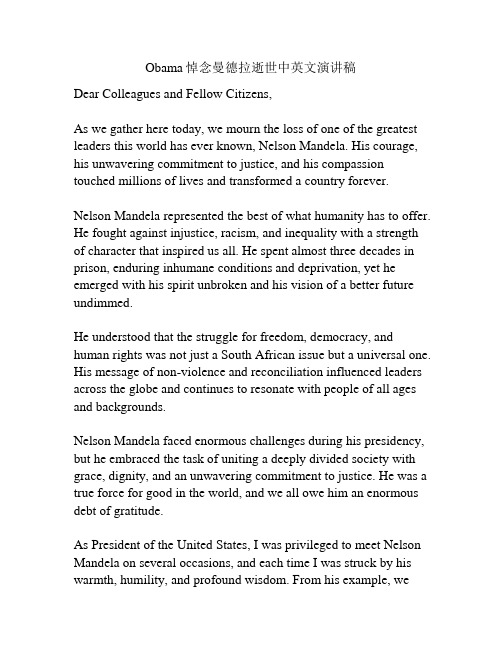
Obama悼念曼德拉逝世中英文演讲稿Dear Colleagues and Fellow Citizens,As we gather here today, we mourn the loss of one of the greatest leaders this world has ever known, Nelson Mandela. His courage, his unwavering commitment to justice, and his compassion touched millions of lives and transformed a country forever.Nelson Mandela represented the best of what humanity has to offer. He fought against injustice, racism, and inequality with a strength of character that inspired us all. He spent almost three decades in prison, enduring inhumane conditions and deprivation, yet he emerged with his spirit unbroken and his vision of a better future undimmed.He understood that the struggle for freedom, democracy, and human rights was not just a South African issue but a universal one. His message of non-violence and reconciliation influenced leaders across the globe and continues to resonate with people of all ages and backgrounds.Nelson Mandela faced enormous challenges during his presidency, but he embraced the task of uniting a deeply divided society with grace, dignity, and an unwavering commitment to justice. He was a true force for good in the world, and we all owe him an enormous debt of gratitude.As President of the United States, I was privileged to meet Nelson Mandela on several occasions, and each time I was struck by his warmth, humility, and profound wisdom. From his example, welearned the power of forgiveness, the importance of building bridges, and the need to confront the darkness in ourselves and in our societies.Nelson Mandela's legacy will continue to inspire us for generations to come. His vision of a world in which all people are treated with dignity and respect, regardless of their race, religion, or background, must always remain our guiding light. We must strive to build on his work, to continue the fight for justice and equality, and to create a better world for all.So let us honor Nelson Mandela's memory by carrying forward his message of hope, courage and love. Let us renew our commitment to the ideals that he so passionately championed and work together to build a brighter future for all.Thank you.。
奥巴马纪念曼德拉演讲
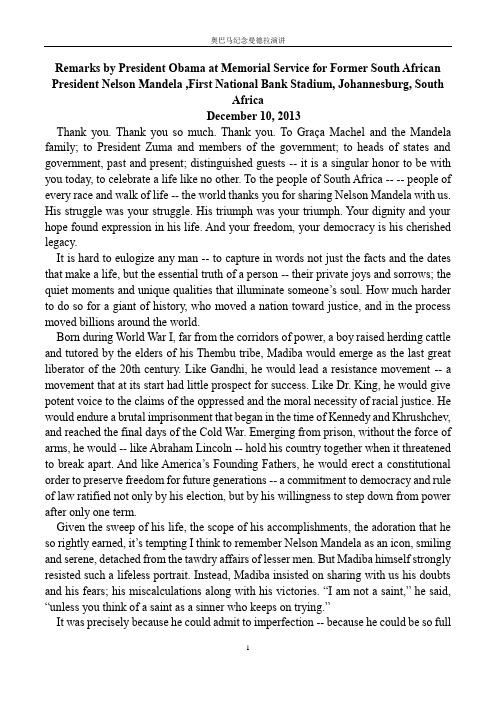
Remarks by President Obama at Memorial Service for Former South African President Nelson Mandela ,First National Bank Stadium, Johannesburg, SouthAfricaDecember 10, 2013Thank you. Thank you so much. Thank you. To GraçaMachel and the Mandela family; to President Zuma and members of the government; to heads of states and government, past and present; distinguished guests -- it is a singular honor to be with you today, to celebrate a life like no other. To the people of South Africa -- -- people of every race and walk of life -- the world thanks you for sharing Nelson Mandela with us. His struggle was your struggle. His triumph was your triumph. Your dignity and your hope found expression in his life. And your freedom, your democracy is his cherished legacy.It is hard to eulogize any man -- to capture in words not just the facts and the dates that make a life, but the essential truth of a person -- their private joys and sorrows; the quiet moments and unique qualities that illumi nate someone’s soul. How much harder to do so for a giant of history, who moved a nation toward justice, and in the process moved billions around the world.Born during World War I, far from the corridors of power, a boy raised herding cattle and tutored by the elders of his Thembu tribe, Madiba would emerge as the last great liberator of the 20th century. Like Gandhi, he would lead a resistance movement -- a movement that at its start had little prospect for success. Like Dr. King, he would give potent voice to the claims of the oppressed and the moral necessity of racial justice. He would endure a brutal imprisonment that began in the time of Kennedy and Khrushchev, and reached the final days of the Cold War. Emerging from prison, without the force of arms, he would -- like Abraham Lincoln -- hold his country together when it threatened to break apart. And like America’s Founding Fathers, he would erect a constitutional order to preserve freedom for future generations -- a commitment to democracy and rule of law ratified not only by his election, but by his willingness to step down from power after only one term.Given the sweep of his life, the scope of his accomplishments, the adoration that he so rightly earned, it’s tempting I think to remember Nelson Ma ndela as an icon, smiling and serene, detached from the tawdry affairs of lesser men. But Madiba himself strongly resisted such a lifeless portrait. Instead, Madiba insisted on sharing with us his doubts and his fears; his miscalculations along with his vi ctories. “I am not a saint,” he said, “unless you think of a saint as a sinner who keeps on trying.”It was precisely because he could admit to imperfection -- because he could be sofull of good humor, even mischief, despite the heavy burdens he carried -- that we loved him so. He was not a bust made of marble; he was a man of flesh and blood -- a son and a husband, a father and a friend. And that’s why we learned so much from him, and that’s why we can learn from him still. For nothing he achieved was ine vitable. In the arc of his life, we see a man who earned his place in history through struggle and shrewdness, and persistence and faith. He tells us what is possible not just in the pages of history books, but in our own lives as well.Mandela showed us the power of action; of taking risks on behalf of our ideals. Perhaps Madiba was right that he inherited, “a proud rebelliousness, a stubborn sense of fairness” from his father. And we know he shared with millions of black and colored South Africans the ang er born of, “a thousand slights, a thousand indignities, a thousand unremembered moments…a desire to fight the system that imprisoned my people,” he said.But like other early giants of the ANC -- the Sisulus and Tambos -- Madiba disciplined his anger and channeled his desire to fight into organization, and platforms, and strategies for action, so men and women could stand up for their God-given dignity. Moreover, he accepted the consequences of his actions, knowing that standing up to powerful interests an d injustice carries a price. “I have fought against white domination and I have fought against black domination. I’ve cherished the ideal of a democratic and free society in which all persons live together in harmony and with equal opportunities. It is an ideal which I hope to live for and to achieve. But if needs be, it is an ideal for which I am prepared to die.”Mandela taught us the power of action, but he also taught us the power of ideas; the importance of reason and arguments; the need to study not only those who you a gre e with, but also those who you don’t agree with. He understood that ideas cannot be contained by prison walls, or extin guished by a sniper’s bullet. He turned his trial into an indictment of apartheid bec ause of his eloquence and his passion, but also because of his training as an advocate. He used decades in prison to sharpen his arguments, but also to spread his thirst for knowledge to others in the movement. And he learned the language and the customs of his oppressor so that one day he might better convey to them how their own freedom depend upon his.Mandela demonstrated that action and ideas are not enough. No matter how right, they must be chiseled into law and institutions. He was practical, testing his beliefs against the hard surface of circumstance and history. On core principles he was unyielding, which is why he could rebuff offers of unconditional release, reminding the Apartheid regime that prisoners cannot enter into contracts.But as he showed in painstaking negotiations to transfer power and draft new laws, he was not afraid to compromise for the sake of a larger goal. And bec ause he was not only a leader of a movement but a skillful politician, the Constitution that emerged was worthy of this multiracial democracy, true to his vision of laws that protect minority as well as majority rights, and the precious freedoms of every South African. And finally, Mandela understood the ties that bind the human spirit. There is a word in South Africa -- Ubuntu -- (applause) -- a word that captures Mandela’s gre atest gift: his recognition that we are all bound together in ways that are invisible to the eye; that there is a oneness to humanity; that we achieve ourselves by sharing ourselves with others, and caring for those around us.We can never know how much of this sense was innate in him, or how much was shaped in a dark and solitary cell. But we remember the gestures, large and small -- introducing his jailers as honored guests at his inauguration; taking a pitch in a Springbok uniform; turning his family’s heartbreak into a call to confront HIV/AIDS -- that revealed the depth of his empathy and his understanding. He not only embodied Ubuntu, he taught millions to find that truth within themselves.It took a man like Madiba to free not just the prisoner, but the jailer as well -- -- to show that you must trust others so that they may trust you; to teach that reconciliation is not a matter of ignoring a cruel past, but a means of confronting it with inclusion and generosity and truth. He changed laws, but he also changed hearts.For the people of South Africa, for those he inspired around the globe, Madiba’s passing is rightly a time of mourning, and a time to celebrate a heroic life. But I believe it should also prompt in each of us a time for self-reflection. With honesty, regardless of our station or our circumstance, we must ask: How well have I applied his lessons in my own life? It’s a question I ask myself, as a man and as a President. We know that, like South Africa, the United States had to overcome centuries of racial subjugation. As was true here, it took sacrifice -- the sacrifice of countless people, known and unknown, to see the dawn of a new day. Michelle and I are beneficiaries of that struggle. But in America, and in South Africa, and in countries all around the globe, we cannot allow our pro gre ss to cloud the fact that our work is not yet done.The struggles that follow the victory of formal equality or universal franchise may not be as filled with drama and moral clarity as those that came before, but they are no less important. For around the world today, we still see children suffering from hunger and disease. We still see run-down schools. We still see young people without prospects for the future. Around the world today, men and women are still imprisonedfor their political beliefs, and are still persecuted for what they look like, and how they worship, and who they love. That is happening today.And so we, too, must act on behalf of justice. We, too, must act on behalf of peace. There are too many people who happily embrace Madiba’s legacy of racial reconciliation, but passionately resist even modest reforms that would challenge chronic poverty and growing inequality. There are too many leaders who claim solidarity with Madiba’s struggle for freedom, but do not tolerate dissent from their own people. (Applause.) And there are too many of us on the sidelines, comfortable in complacency or cynicism when our voices must be heard.The questions we face today -- how to promote equality and justice; how to uphold freedom and human rights; how to end conflict and sectarian war -- these things do not have easy answers. But there were no easy answers in front of that child born in World War I. Nelson Mandela reminds us that it always seems impossible until it is done. South Africa shows that is true. South Africa shows we can change, that we can choose a world defined not by our differences, but by our common hopes. We can choose a world defined not by conflict, but by peace and justice and opportunity.We will never see the likes of Nelson Mandela again. But let me say to the young people of Africa and the young people around the world -- you, too, can make his life’s work your own. Over 30 years ago, while still a student, I learned of Nelson Mandela and the struggles taking place in this beautiful land, and it stirred something in me. It woke me up to my responsibilities to others and to myself, and it set me on an improbable journey that finds me here today. And while I will always fall short of Madiba’s example, he makes me want to be a better man. He speaks to what’s best inside us.After this gre at liberator is laid to rest, and when we have returned to our cities and villages and rejoined our daily routines, let us search for his strength. Let us search for his largeness of spirit somewhere inside of ourselves. And when the night grows dark, when injustice weighs heavy on our hearts, when our best-laid plans seem beyond our reach, let us think of Madiba and the words that brought him comfort within the four walls of his cell:“It matters not how strait the gate, how charged with punishments the scroll, I am the master of my fate: I am the captain of my soul.”What a magnificent soul it was. We will miss him deeply. May God bless the memory of Nelson Mandela. May God bless the people of South Africa.奥巴马总统在悼念南非前总统纳尔逊∙曼德拉的仪式上的讲话第一国家银行体育场,南非,约翰内斯堡2013年12月10日谢谢诸位。
奥巴马曼德拉演讲2篇

奥巴马曼德拉演讲2篇奥巴马演讲:悼念曼德拉的演讲(第一篇)尊敬的各位嘉宾,亲爱的南非人民,女士们,先生们:今天,我们聚集在这里,纪念一位伟大的领袖、一位永恒的朋友——纳尔逊·曼德拉。
他的离世使整个世界感到失落和悲伤。
他是我国的朋友,也是世界的友人。
我曾有幸多次与他会面,并受到他的深深影响。
他留给我们的遗产将永远激励我们向前迈进。
曼德拉的一生充满了倡导和奋斗,他利用自己的智慧与勇气,打破了南非种族隔离政权的枷锁,为国家实现真正的民主与平等而努力。
他是一个和平的斗士,他的信念让他能够躲过岁月的磨难与困苦,并引领南非走上正确的道路。
曼德拉深刻理解和呼吁团结,他反对分裂和仇恨的种子。
他的理想和努力跨越了种族、国籍和宗教的界限。
他一直致力于推动对话与和解的进程,使得南非成为一个充满朝气和希望的国家。
他将自己置于南非人民的利益之上,以国家的团结和民主为首要目标。
曼德拉所传递的信息是深入人心的。
他告诉我们,我们每个人都有能力改变世界。
他的人生经历证明,即使在最黑暗的时刻,我们也能发现光明的方向。
在他的带领下,南非实现了人类历史上最伟大的转变之一。
他的奋斗与胜利不仅仅影响了南非,也激励了整个世界。
纳尔逊·曼德拉的离世是一次巨大的损失,但他的精神将永远留在我们的心中。
他启发了一代又一代的人,不论他们来自何种背景,他们都受到了他的教诲。
他的故事将继续激励着未来的领袖和改变者。
让我们纪念曼德拉的勇气,他对自由和正义的执着。
他的理念将给世界上其他地方的人们带来希望,鼓励他们为正义和和平奋斗。
曼德拉的一生是一份珍贵的礼物,他的离世是我们共同的损失。
现在,我们必须牢记他的遗产,并继续为曼德拉的梦想而奋斗。
谢谢大家。
奥巴马演讲:继续曼德拉的梦想(第二篇)亲爱的朋友们:我们聚集在一起,悼念并纪念曼德拉的一生和他所代表的理念。
他在地球上的存在成为了世界的人们憧憬与追逐的目标。
他的离世使世界陷入了沉思与反思。
曼德拉是一位伟大的领袖,他向我们展示了斗争和希望的力量。
美国总统奥巴马在曼德拉悼念活动中致辞
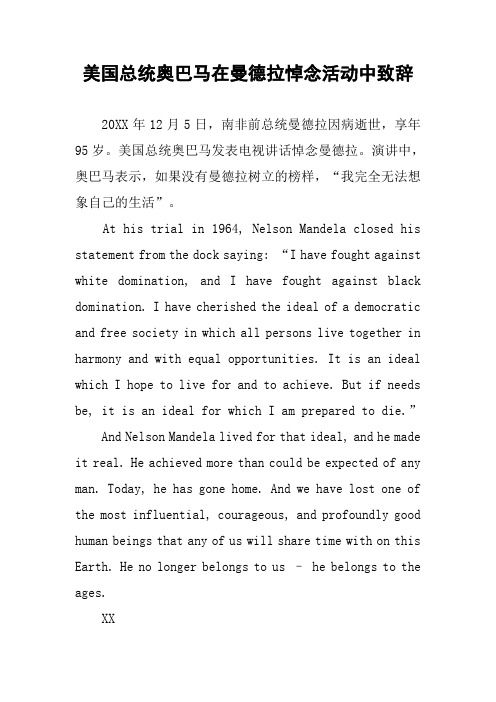
美国总统奥巴马在曼德拉悼念活动中致辞20XX年12月5日,南非前总统曼德拉因病逝世,享年95岁。
美国总统奥巴马发表电视讲话悼念曼德拉。
演讲中,奥巴马表示,如果没有曼德拉树立的榜样,“我完全无法想象自己的生活”。
At his trial in 1964, Nelson Mandela closed his statement from the dock saying: “I have fought against white domination, and I have fought against black domination. I have cherished the ideal of a democratic and free society in which all persons live together in harmony and with equal opportunities. It is an ideal which I hope to live for and to achieve. But if needs be, it is an ideal for which I am prepared to die.”And Nelson Mandela lived for that ideal, and he made it real. He achieved more than could be expected of any man. Today, he has gone home. And we have lost one of the most influential, courageous, and profoundly good human beings that any of us will share time with on this Earth. He no longer belongs to us – he belongs to the ages.XXThrough his fierce dignity and unbending will to sacrifice his own freedom for the freedom of others, Madiba transformed South Africa – and moved all of us. His journey from a prisoner to a president embodied the promise that human beings –and countries –can change for the better.His mitment to transfer power and reconcile with those who jailed him set an example that all humanity should aspire to, whether in the lives of nations or our own personal lives. And the fact that he did it all with grace and good humour, and an ability to acknowledge his own imperfections, only makes the man that much more remarkable. As he once said, “I am not a saint, unless you think of a saint as a sinner who keeps on trying.”I am one of the countless millions who drew inspiration from Nelson Mandela’s life. My very first political action, the first thing I ever did that involved an issue or a policy or politics, was a protest against apartheid. I studied his words and his writings. The day that he was released from prison gave me a sense of what human beings can do when they’re guided by theirhopes and not by their fears. And like so many around the globe, I cannot fully imagine my own life without the example that Nelson Mandela set, and so long as I live I will do what I can to learn from him.XXTo Graca Machel and his family, Michelle and I extend our deepest sympathy and gratitude for sharing this extraordinary man with us. His life’s work meant long days away from those who loved him the most. And I only hope that the time spent with him these last few weeks brought peace and fort to his family.To the people of South Africa, we draw strength from the example of renewal, and reconciliation, and resilience that you made real. A free South Africa at peace with itself – that’s an example to the world, and that’s Madiba’s legacy to the nation he loved.We will not likely see the likes of Nelson Mandela again. So it falls to us as best we can to forward the example that he set: to make decisions guided not by hate, but by love; to never discount the difference that one person can make; to strive for a future that is worthy of his sacrifice.For now, let us pause and give thanks for the fact that Nelson Mandela lived – a man who took history in his hands, and bent the arc of the moral universe toward justice. May God bless his memory and keep him in peace.XX。
201312南非前总统曼德拉因病逝世演讲

•Hale Waihona Puke 南非前总统纳尔逊· 曼德拉去世,终年95岁。 这位曾被囚禁达27年之久的反种族隔离斗士,几 乎用了自己青春和壮年的岁月,推动南非废除白 人的种族隔离政策,为新南非的诞生和发展作出 了历史性贡献。他逝世的消息传开后,各国领导 人纷纷在第一时间表示沉痛哀悼。曼德拉的国葬 及其他纪念活动前后将持续11天,出席这一代伟 人葬礼的各国领袖不计其数。作为跨世纪的政治 家,他无疑是两个世纪最伟大的人之一。他也许 没有一些大国领袖的文治武功,但其人格魅力却 足以让今天乃至后来的人景仰。
我的感想
• 哲人已逝,世界上不可能再出现另一位曼德拉。当全球 深切缅怀这位时代巨人时,一生奉献肤色斗争的曼德拉留给 全世界的遗产是珍贵丰厚的,他让世人看到人类可以拥抱共 同认可的理念与价值观,高贵的政治应该超越种族、国籍、 宗教与意识形态,全世界看到的不仅是曼德拉为抗争不公平 的种族隔离奉献了一生,更可贵的是他以一个人的品德、行 为和贡献,为整个人类文明树立了难以超越的典范。他的传 奇之处与独特之处不仅仅在于,他出身于富贵之家,口含金 钥匙来到人间,本来有着广阔的个人前景,但是,他却自愿 走一条解放之路,而且更在于他的人格精神的伟大。曼德拉 留给世人的遗产,远大于南非为他举行的国葬仪式以及美国 总统奥巴马给予他的崇高赞誉。曼德拉,以其思想的隽永和 身体力行,给人类留下了厚重的遗产。他是政治家的楷模, 是种族偏见和文明冲突的协调者。 • 曼德拉,一个不朽的灵魂。
谢谢观赏
初二(2)班
程珏轶
•
曼德拉,1918年7月18日出生于南非特兰斯凯一个大酋长 家庭,先后获南非大学文学士和威特沃特斯兰德大学律师资 格,当过律师。曼德拉自幼性格刚强,崇敬民族英雄。他是 家中长子而被指定为酋长继承人。但他表示:“决不愿以酋 长身份统治一个受压迫的部族”,而要“以一个战士的名义 投身于民族解放事业”。 作为南非的反种族隔离者,他进行了长达半个世纪 (1944年至1994年)的不懈斗争,铁窗生涯就近28年(1962 年至1990年),终于迎来南非白人种族政权的瓦解,并成为 南非第一位黑人总统。他开创了民主自由和种族和解的新南 非,在1993年10月,诺贝尔和平委员会授予他诺贝尔和平奖, 以表彰他为废除南非种族歧视政策所作出的贡献。他只任一 届总统,却是南非终身荣誉总统;他被称为南非国父,更被 选为南非最伟大的人。 • 曼德拉既有艰苦卓绝的斗争史,又荣获了无尽的荣誉。 名利于他,早就没有任何意义,纵观20世纪的风云史,无论 是民族解放的斗士,还是各国的开国元勋,鲜有如曼德拉者。 •
卡梅伦对曼德拉逝世表哀悼_400字
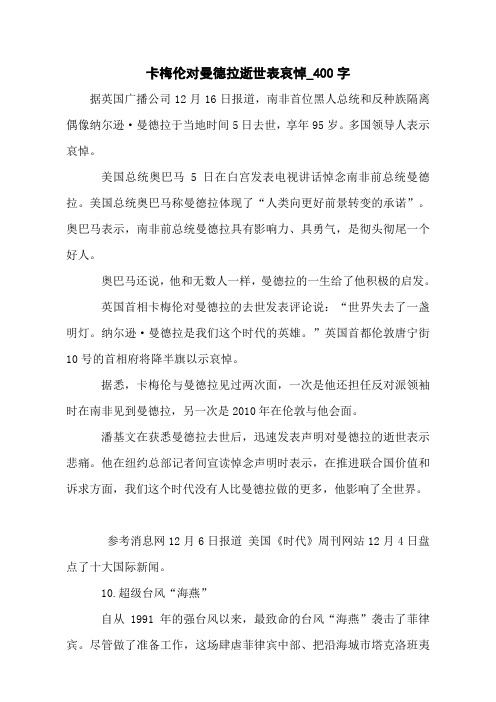
卡梅伦对曼德拉逝世表哀悼_400字
据英国广播公司12月16日报道,南非首位黑人总统和反种族隔离偶像纳尔逊·曼德拉于当地时间5日去世,享年95岁。
多国领导人表示哀悼。
美国总统奥巴马5日在白宫发表电视讲话悼念南非前总统曼德拉。
美国总统奥巴马称曼德拉体现了“人类向更好前景转变的承诺”。
奥巴马表示,南非前总统曼德拉具有影响力、具勇气,是彻头彻尾一个好人。
奥巴马还说,他和无数人一样,曼德拉的一生给了他积极的启发。
英国首相卡梅伦对曼德拉的去世发表评论说:“世界失去了一盏明灯。
纳尔逊·曼德拉是我们这个时代的英雄。
”英国首都伦敦唐宁街10号的首相府将降半旗以示哀悼。
据悉,卡梅伦与曼德拉见过两次面,一次是他还担任反对派领袖时在南非见到曼德拉,另一次是2010年在伦敦与他会面。
潘基文在获悉曼德拉去世后,迅速发表声明对曼德拉的逝世表示悲痛。
他在纽约总部记者间宣读悼念声明时表示,在推进联合国价值和诉求方面,我们这个时代没有人比曼德拉做的更多,他影响了全世界。
参考消息网12月6日报道美国《时代》周刊网站12月4日盘点了十大国际新闻。
10.超级台风“海燕”
自从1991年的强台风以来,最致命的台风“海燕”袭击了菲律宾。
尽管做了准备工作,这场肆虐菲律宾中部、把沿海城市塔克洛班夷。
【精编范文】奥巴马曼德拉演讲word版本 (8页)
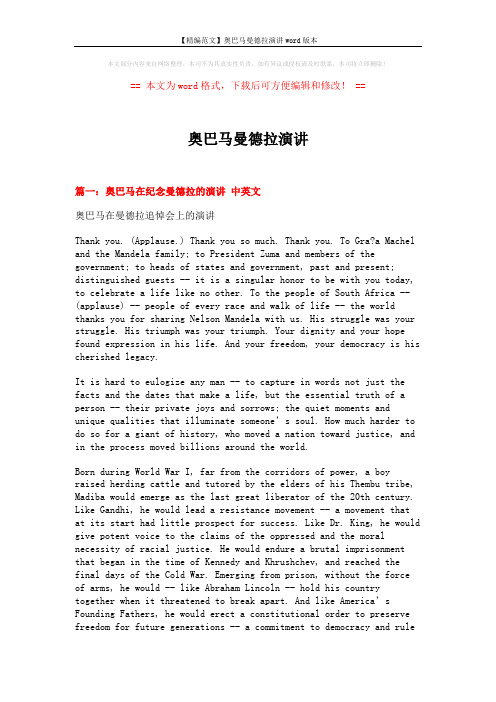
本文部分内容来自网络整理,本司不为其真实性负责,如有异议或侵权请及时联系,本司将立即删除!== 本文为word格式,下载后可方便编辑和修改! ==奥巴马曼德拉演讲篇一:奥巴马在纪念曼德拉的演讲中英文奥巴马在曼德拉追悼会上的演讲Thank you. (Applause.) Thank you so much. Thank you. To Gra?a Machel and the Mandela family; to President Zuma and members of the government; to heads of states and government, past and present; distinguished guests -- it is a singular honor to be with you today, to celebrate a life like no other. To the people of South Africa -- (applause) -- people of every race and walk of life -- the world thanks you for sharing Nelson Mandela with us. His struggle was your struggle. His triumph was your triumph. Your dignity and your hope found expression in his life. And your freedom, your democracy is his cherished legacy.It is hard to eulogize any man -- to capture in words not just the facts and the dates that make a life, but the essential truth of a person -- their private joys and sorrows; the quiet moments and unique qualities that illuminate someone’s soul. How much harder to do so for a giant of history, who moved a nation toward justice, and in the process moved billions around the world.Born during World War I, far from the corridors of power, a boy raised herding cattle and tutored by the elders of his Thembu tribe, Madiba would emerge as the last great liberator of the 20th century. Like Gandhi, he would lead a resistance movement -- a movement that at its start had little prospect for success. Like Dr. King, he would give potent voice to the claims of the oppressed and the moral necessity of racial justice. He would endure a brutal imprisonment that began in the time of Kennedy and Khrushchev, and reached the final days of the Cold War. Emerging from prison, without the force of arms, he would -- like Abraham Lincoln -- hold his country together when it threatened to break apart. And like America’s Founding Fathers, he would erect a constitutional order to preserve freedom for future generations -- a commitment to democracy and ruleof law ratified not only by his election, but by his willingness to step down from power after only one term.Given the sweep of his life, the scope of his accomplishments, the adoration that he so rightly earned, it’s tempting I think to remember Nelson Mandela as an icon, smiling and serene, detached from the tawdry affairs of lesser men. But Madiba himself stronglyresisted such a lifeless portrait. (Applause.) Instead, Madibainsisted on sharing with us his doubts and his fears; his miscalculations along with his victories.“I am not a saint,” he said, “unless you think of a saint as a sinner who keeps on trying.”It was precisely because he could admit to imperfection -- because he could be so full of good humor, even mischief, despite the heavy burdens he carried -- that we loved him so. He was not a bust made of marble; he was a man of flesh and blood -- a son and a husband, a father and a friend. And that’s why we learne d so much from him, and that’s why we can learn from him still. For nothing he achieved was inevitable. In the arc of his life, we see a man who earned his place in history through struggle and shrewdness, and persistence and faith. He tells us what is possible not just in the pages of history books, but in our own lives as well.Mandela showed us the power of action; of taking risks on behalf of our ideals. Perhaps Madiba was right that he inherited, “a proud rebelliousness, a stubborn sense of fairness” from his father. Andwe know he shared with millions of black and colored South Africans the anger born of, “a thousand slights, a thousand indignities, a thousand uemembered moments?a desire to fight the system that imprisoned my people,” he said.But like other early giants of the ANC -- the Sisulus and Tambos -- Madiba disciplined his anger and channeled his desire to fight into organization, and platforms, and strategies for action, so men and women could stand up for their God-given dignity. Moreover, he accepted the consequences of his actions, knowing that standing up to powerful interests and injustice carries a price. “I have fought against white domination and I have fought against black domination. I’ve cherished the ideal of a democratic and fre e society in whichall persons live together in harmony and [with] equal opportunities.It is an ideal which I hope to live for and to achieve. But if needs be, it is an ideal for which I am prepared to die.” (Applause.)Mandela taught us the power of action, but he also taught us the power of ideas; the importance of reason and arguments; the need to study not only those who you agree with, but also those who youdon’t agree with. He understood that ideas cannot be contained by prison walls, or extinguish ed by a sniper’s bullet. He turned his trial into an indictment of apartheid because of his eloquence and his passion, but alsobecause of his training as an advocate. He used decades in prison to sharpen his arguments, but also to spread his thirst for knowledge to others in the movement. And he learned the language and the customs of his oppressor so that one day he might better convey to them how their own freedom depend upon his. (Applause.)Mandela demonstrated that action and ideas are not enough. No matter how right, they must be chiseled into law and institutions. He was practical, testing his beliefs against the hard surface of circumstance and history. On core principles he was unyielding, which is why he could rebuff offers of unconditional release, reminding the Apartheid regime that “prisoners cannot enter into contracts.But as he showed in painstaking negotiations to transfer power and draft new laws, he was not afraid to compromise for the sake of a larger goal. And because he was not only a leader of a movement but a skillful politician, the Constitution that emerged was worthy of this multiracial democracy, true to his vision of laws that protect minority as well as majority rights, and the precious freedoms of every South African.And finally, Mandela understood the ties that bind the human spirit. There is a word in South Africa -- Ubuntu -- (applause) -- a wordthat captures Mandela’s greatest gift: his recognition that we are all bound together in ways that are invisible to the eye; that there is a oneness to humanity; that we achieve ourselves by sharing ourselves with others, and caring for those around us.We can never know how much of this sense was innate in him, or how much was shaped in a dark and solitary cell. But we remember the gestures, large and small -- introducing his jailers as honored guests at his inauguration; taking a pitch in a Springbok uniform; turning his family’s heartbreak into a call to confront HIV/AIDS -- that revealed the depth of his empathy and his understanding. He not only embodied Ubuntu, he taught millions to find that truth within themselves.。
- 1、下载文档前请自行甄别文档内容的完整性,平台不提供额外的编辑、内容补充、找答案等附加服务。
- 2、"仅部分预览"的文档,不可在线预览部分如存在完整性等问题,可反馈申请退款(可完整预览的文档不适用该条件!)。
- 3、如文档侵犯您的权益,请联系客服反馈,我们会尽快为您处理(人工客服工作时间:9:00-18:30)。
Barack Obama:Remarks at Memorial Service for Former South African President Nelson Mandela巴拉克•奥巴马在在南非前总统曼德拉追悼会上的悼辞Delivered December 10, 2013, First National Bank Stadium, Johannesburg, South Africa2013年12月10日发表于南非约翰内斯堡国家第一银行运动场张少军译、校Thank you. (Applause.) Thank you so much. Thank you. To Graça Machel and the Mandela family; to President Zuma and members of the government; to heads of states and government, past and present; distinguished guests -- it is a singular honor to be with you today, to celebrate a life like no other. To the people of South Africa -- (applause) -- people of every race and walk of life -- the world thanks you for sharing Nelson Mandela with us. His struggle was your struggle. His triumph was your triumph. Your dignity and your hope found expression in his life. And your freedom, your democracy is his cherished legacy.谢谢你们!非常感谢你们!谢谢各位!格拉萨•马歇尔(莫桑比克前总统马歇尔遗孀、曼德拉的最后一任妻子)、曼德拉家族成员、祖马总统和政府成员、各国或各政府的前任或现任首脑、尊敬的各位嘉宾:今天能和你们一起来纪念一位非凡的人是一种难得的荣誉。
南非人民——各种族各行业的南非人:世界感谢你们和我们一起分享曼德拉。
他的奋斗就是你们的奋斗。
他的凯旋就是你们的凯旋。
你们的尊严与希望在他的生命中找到了最好的表达,你们的自由与民主政体是他最宝贵的遗产。
It is hard to eulogize any man -- to capture in words not just the facts and the dates that make a life, but the essential truth of a person -- their private joys and sorrows; the quiet moments and unique qualities t hat illuminate someone’s soul. How much harder to do so for a giant of history, who moved a nation toward justice, and in the process moved billions around the world.颂扬一个人其实很难——光凭言语,不仅要捕捉那些造就一个生命的事实与岁月,更要描绘一个人的本质精神,描绘那能够揭示某人灵魂的他那私密的欢乐与悲哀,他那安静的时刻与独特的品质;而要颂扬一位历史巨人,一位鼓舞一个国家走向正义并在这过程中鼓舞了全球几十亿人民的巨人,更是难上加难。
Born during World War I, far from the corridors of power, a boy raised herding cattle and tutored by the elders of his Thembu tribe, Madiba would emerge as the last great liberator of the 20th century. Like Gandhi, he would lead a resistance movement -- a movement that at its start had little prospect for success. Like Dr. King, he would give potent voice to the claims of the oppressed and the moral necessity of racial justice. He would endure a brutal imprisonment that began in the time of Kennedy and Khrushchev, and reached the final days of the Cold War. Emerging from prison, without the force of arms, he would -- like Abraham Lincoln -- hold his country together when it threatened to break apart. And like America’s Founding Fathers, he would erect a constitutional order to preserve freedom for future generations -- a commitment to democracy and rule of law ratified not only by his election, but by his willingness to step down from power after only one term.出生于第一次世界大战期间,远离权力的中心,在放牧牲口中长大,在坦布部落长者的教导下成人,马迪巴(部落长者给曼德拉的荣誉头衔,后来成了曼德拉的同义词)将成为20世纪最后一位伟大的解放者。
如同甘地,他将领导一个反抗运动——一个开始时几乎看不到成功前景的运动;如同马丁•路德•金博士,他为被压迫者为种族平等的道德必要性发出有力的声音;他将忍受残酷的监禁,从肯尼迪与赫鲁晓夫的时代开始,直到冷战的结束;出狱后,放弃武力,如同亚伯拉罕•林肯,他将把他面临分裂威胁的国家团结在一起;如同美国的开国领袖们,他将建立宪政秩序为未来的世世代代保有自由——不仅通过选举执政,而且通过一届总统任期后的自愿放弃权力,来信守他对民主和法治的承诺。
Given the sweep of his life, the scope of his accomplishments, the adoration that he so rightly earned, it’s tempting I think to remember Nelson Mandela as an icon, smil ing and serene, detached from the tawdry affairs of lesser men. But Madibahimself strongly resisted such a lifeless portrait. (Applause.) Instead, Madiba insisted on sharing with us his doubts and his fears; his miscalculations along with his victories. “I am not a saint,” he said, “unless you think of a saint as a sinner who keeps on trying.”鉴于他旋风般的一生、他生平成就的高度、他理应赢得的爱戴,我想,建一座平静微笑的、区别于一般人俗艳浮夸的雕像来纪念纳尔逊•曼德拉,应该是一个诱人的想法。
然而曼德拉本人强烈反对这样一种毫无生气的雕像。
反之,曼德拉坚持与我们一起分享他的怀疑与畏惧,以及伴随着胜利的他的失误。
“我不是圣人,”他说,“除非你们认为圣人就是一个不断努力的罪犯。
”It was precisely because he could admit to imperfection -- because he could be so full of good humor, even mischief, despite the heavy burdens he carried -- that we loved him so. He was not a bust made of marble; he was a man of flesh and blood -- a son and a husband, a father and a friend. And that’s why we learned so much from him, and that’s wh y we can learn from him still. For nothing he achieved was inevitable. In the arc of his life, we see a man who earned his place in history through struggle and shrewdness, and persistence and faith. He tells us what is possible not just in the pages of history books, but in our own lives as well.正因为他能够承认自身的不完美,他是那样充满幽默感,所以他即便身负重任依然是那样淘气——而我们也喜欢他这样。
他不是大理石雕制的半身像,他是一个有血有肉的人——一个儿子、一个丈夫、一个父亲、一位朋友。
这就是为什么,我们从他身上学到如此之多;这就是为什么,我们依然要向他学习。
他所取得的成功,没有一样是必然发生的。
在他生命的轨迹中,我们认识到一个人是如何凭借奋斗、机敏、坚持与信念来赢得自己在历史上的地位。
